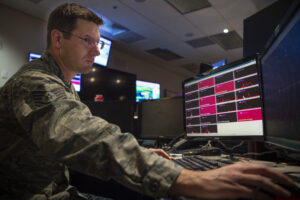However, simply standing up a new military service is not enough.
The Space Force is projected to be about 16,000 strong — which is one-tenth the size of the next smallest branch of the armed forces, the U.S. Marine Corps. With such a lean workforce, the Space Force must be extraordinarily proficient, efficient and effective.
The leaders charged with building this service recognize this imperative and are pursuing a digital transformation to create a competitive advantage. The Space Force’s Vision for a Digital Service is about leveraging knowledge, tools and practices to accelerate the delivery of capabilities, streamline bureaucratic processes, empower data-driven decisions and advance operations.
Beyond the imperative for change, aspiring to be a digital service is a natural fit for the Space Force. Activities in outer space have always been technologically demanding and technology driven. Space is literally the realm of rocket science, orbital mechanics, and general relativity. Moreover, space is the only physical domain in which there are no humans physically present to conduct military operations.
With this in mind, the Space Force is moving out quickly and deliberately toward its vision to be an interconnected, innovative and digitally dominant force.
Interconnected means being a diverse but cohesive team of teams that instinctively collaborates and that shares relevant information. Innovative means developing a creative culture that fosters learning and growth, routinely challenges the status quo, and is empowered to solve hard problems. Digitally dominant means digital processes and technology are embedded into the service’s foundation.
While the vision is aspirational, steps are already being taken to build an interconnected, innovative, digitally dominant Space Force.
This year, space acquisition professionals are establishing the technological foundation for a digital architecture that provides secure and reliable data storage, access and exchange. This ecosystem will serve as the critical enabler to link force design, capability planning, systems engineering, testing and operational concepts in a digital thread.
Three pathfinder programs are slated to plug into this environment to sync with industry partners, build and share virtual copies of real-world systems, and conduct technical reviews. At Space Force headquarters, other pilot efforts are underway to reinvent and automate business processes, eliminate unnecessary delays and provide a data-driven approach to plan resource investments and manage talent across the service.
Technology advancements must be paired with people investments. The Space Force has issued over 6,000 Digital University licenses to give every Guardian a bedrock level of fluency on modern digital topics. To date, over 30 percent of our personnel have completed the coursework.
The Space Force has established its own software developer training program for building and deploying software using modern platforms and methodologies. This is allowing us to forge a cadre of organic computer coders (known as Supra Coders) tied to Space Operations Command’s combat development teams. These Supra Coders will work side by side with industry developers to address operational challenges across the Space Force.
To continually guide these efforts, the Space Force founded a technology innovation office that reports directly to the Chief of Space Operations. This office is the first of its kind in the Defense Department to champion science, technology and digital transformation.
The Space Force is the smallest of the armed services but is focused on the largest physical domain. To successfully confront this challenge, the Space Force will leverage its technological roots and leverage today’s commercial innovation to pave the way for the digital transformation of our military. This is not just sound strategy; it is a necessity to ensure space remains secure for the U.S. and its allies.
Active engagement across government, industry, academia, the media and the general public will continue to be critical to the fulfillment of the Space Force’s digital vision.
Many Americans are blissfully unaware of the extent to which our nation’s prosperity is tied to the space domain. Satellites operate hundreds to thousands of miles above the world we know. Other than catching a curious glimpse of a fast-moving bright light in the night sky, the satellites all of us depend upon are not something most of us think about day to day. Consequently, it’s all too easy for all of us — civilian and military alike — to take these capabilities for granted.
Kim Crider is a retired U.S. Air Force major general who recently served as acting chief technology and innovation officer of the U.S. Space Force.



